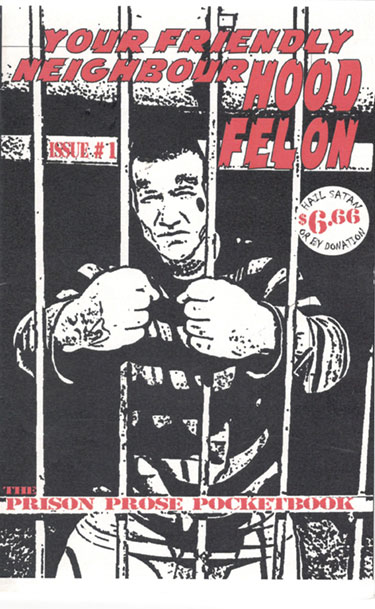
Your Friendly Neighbourhood Felon: The Prison Prose Pocketbook
litzine, Lil Dave, @lil_d_666_schemaddict, $6.66 or by donation
In, Your Friendly Neighbourhood Felon, Lil Dave chronicles his four years in prison in 32 poems. I’ll admit I was already tiring of prison-drug-badass narratives before reading the zine. It’s usually accompanied by a transparent and tiring machismo that seems straight from the land of overcompensating men. Sure, incarceration is messed up, and doesn’t bring out the best in people, so I won’t begrudge men finding ways to express themselves in such a situation. Still, this zine is rife with the tough guy toxic masculinity prominent in prison narratives (one of the poems is even called “Rough Tough”), so there’s your heads up.
The thesis of almost every poem is “I’m tough” or “I like drugs and don’t want to.” Dave’s ping-ponging back from false overconfidence to questioning if he has the strength to control himself is a telling contrast. Some of his images and metaphors are great, others are cringe-worthy. For example, “I have changed the wipers on the windshield of my soul. My internal furnace will no longer burn coal.”
The most important thing to Lil Dave, besides the fact that prison sucks, is that the rhyme schemes sound nice and flow. These poems would do a lot better in rap form, and maybe they are raps? When you put lyrics onto music, there’s a little more grace. You can hide behind the beat or the melody. With poetry, your words are naked. If they lack substance, it will be immediately apparent.
Sometimes you can tell there’s a story behind the poem that is probably meatier than others. For example, “The black sheep of the family, negativity repels the good in me.” This line about his family shows us he has a life full of complicated family dynamics but he leaves it to one line.
A lot of these poems would be served better as stories, raps or creative non-fiction. Right now, Lil Dave is too set in what he considers true poetic structure to really say what he wants to say.
